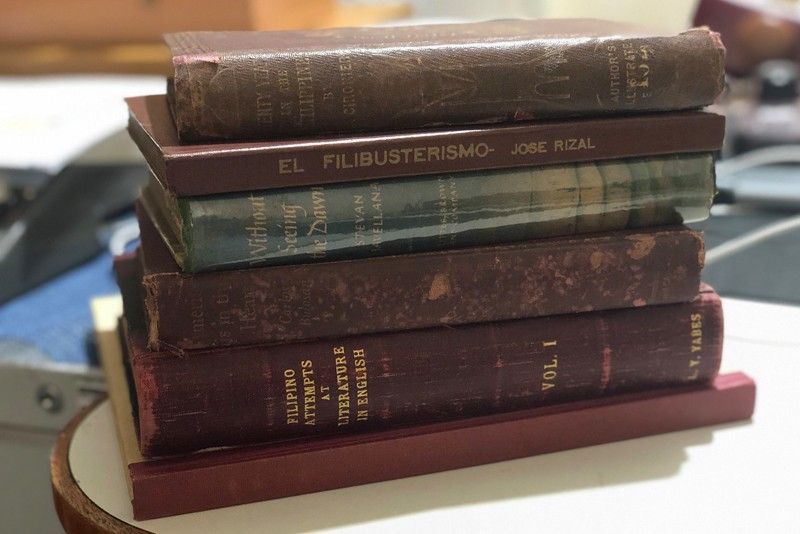A feast for book lovers

I told a historian-friend who couldn’t figure out why I was obsessed with finding original texts of easily accessible books, ‘The object is the object.’
(Conclusion)
Last Saturday, at the 10th Philippine International Literary Festival sponsored by the National Book Development Board, I joined a panel discussion on “Advanced and Antiquarian Book Collecting,” and since most of you weren’t there to hear me and my fellow panelists Anthony John Balisi and Francis Ong, I’d like to share part of what I said.
As most of my readers know, I’ve long been a collector of fountain pens, especially vintage ones going back to the early 20th century. I still have a couple of hundred pens in the collection, which I’ve begun trimming down for the inevitable day when our only daughter will have to deal with all the junk her weird papa left behind. Well, she’s going to have to deal with a lot more than pens, because over the past few years or so, I’ve also begun to amass collections of midcentury paintings, typewriters, and, yes, old books.
I’ll talk about those other afflictions some other time — although I’m sure you see a pattern somewhere there. To focus on book collecting, let’s start with the basic proposition that people buy books to read, usually for education or entertainment. That’s how all book collectors begin: as readers who enjoy the word on the page. But collectors are excited by more than what books contain or mean; they enjoy the book itself as a cultural artifact (and yes, as a tradeable commodity), as a physical manifestation of ideas, and as a work of art and technology in itself.
Book publishing has a long and fascinating history, and important books — like the Gutenberg Bible (1455), our own Doctrina Christiana (1593), and Jose Rizal’s Noli Me Tangere (1887) and El Filibusterismo (1891) — are much sought after. Because of the sheer number of books published since Gutenberg, collectors tend to focus on specific areas like art, religion, history, geography, cooking, horticulture, and such.
I’m not even going to pretend that I’ve read or can read many of the books in my library; some are in languages like Latin or old French and Spanish, and while I can guess at some meanings with the help of a dictionary, I’d be better off with a readily available translation. So why do I buy and keep these books? Why even go for, say, first editions when cheap copies of modern editions abound?
It’s because I feel like I’m saving many of these books from oblivion, and that it’s important for future generations to see and appreciate these texts in their original state. In fact, many items in my collection began as props for teaching; you can’t imagine how surprised and thrilled my literature students are when I show them an actual copy of The Gentleman’s Magazine from 1773 when we discuss what the early colonists in America must have been reading, or a 1935 issue of The Prairie Schooner where a story by Manuel Arguilla titled “Midsummer” appeared. It’s what I’ve been calling “the materiality of literature,” its occurrence as a phenomenon as physical and as necessary as the Internet and satellite TV today. Like I told a historian-friend who couldn’t figure out why I was obsessed with finding original texts of easily accessible books, “The object is the object.”
Most of my books these days come from eBay, which gives me access to a global trove of books, many of them obscure and unappreciated where they are. I’ve gotten choice books from as far as Portugal and Guatemala this way. But some of my most remarkable finds have been local pickups — like books signed by Amado V. Hernandez and Atang de la Rama, delivered to me in Intramuros by a seller on a bicycle, or a signed first edition of Carlos Bulosan’s America Is in the Heart, which I bought in Jollibee Philcoa.
For show-and-tell last Saturday, I was happy to share some of these best finds:
1. An Abridgement of the Notable Works of Polidore Vergil by Thomas Langley. Published in London in 1551, it’s the oldest volume in my collection — found, of all places, in olx.ph, and picked up by me from its seller in Cubao one dark Christmas Eve. (And how does a 470-year-old English book of essays end up in Cubao? Via Paris, where the seller’s mother worked as an OFW, and was gifted by her client with the book.)
2. El Filibusterismo by Jose Rizal, in the second edition published by Chofre in Manila in 1900. Another local pickup, found online.
3. America Is in the Heart by Carlos Bulosan, another copy of the 1946 first edition, second printing, gifted to me by Greg Brillantes to replace the copy I gave my daughter as a wedding present.
4. Without Seeing the Dawn by Stevan Javellana, a 1947 first edition, signed by its first owner Zoilo Galang, our first Filipino novelist in English, found in Megamall.
5. Doctrina Christiana, a facsimile edition published by the Library of Congress in 1947, very soon after this oldest of Philippine books joined the LOC collection, my copy signed by its donor and benefactor, Lessing J. Rosenwald, found on eBay.
6. Filipino Attempts at Literature in English, a one-of-its-kind compilation put together by a young Leopoldo Yabes in the 1930s, who gifted it to poet Jimmy Abad, who passed it on to me for restoration. (This book, like many others, will be bequeathed to the University of the Philippines.)
If these precious books survive me — and they will — then my mad chase for them will make final and total sense.
* * *
Email me at jose@dalisay.ph and visit my blog at www.penmanila.ph.



















